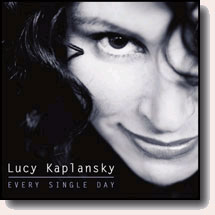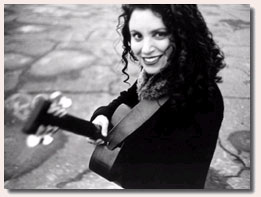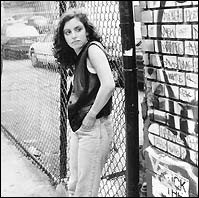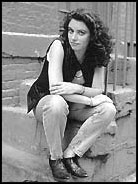|
CD Review by Lou Wigdor Onward and Upward with
Lucy Kaplansky |
 “It’s
got more hooks than my fly fishing box,” was a friend’s reaction
to first hearing Lucy Kaplansky’s newest and fourth CD, Every
Single Day (Red House Records). When I voiced the same sentiments
-- a bit less figuratively -- to Lucy, her response was decisive: “That’s
great. That’s really good to hear.” By every single account, Every
Single Day appears to be a breakthrough album -- both
aesthetically and commercially -- for the Manhattan-based singer
songwriter. Released on September 11, the disk has captured kudos in
review after review. And in spite of its inauspicious release date, it
is selling at double the pace of its much admired predecessor, Ten
Year Night. Like that album, Every Single Day features the
stellar studio team of Larry Campbell (guitars, fiddle, mandolin,
cittern); Duke Levine (electric guitar, mandola); John Herrington
(electric slide); Zev Katz (bass); and Ben Wittman (drums, percussion,
and the album’s producer). Add to that splendid vocal assistance
from Jennifer Kimball, Buddy Miller, John Gorka, and Richard Shindell. “It’s
got more hooks than my fly fishing box,” was a friend’s reaction
to first hearing Lucy Kaplansky’s newest and fourth CD, Every
Single Day (Red House Records). When I voiced the same sentiments
-- a bit less figuratively -- to Lucy, her response was decisive: “That’s
great. That’s really good to hear.” By every single account, Every
Single Day appears to be a breakthrough album -- both
aesthetically and commercially -- for the Manhattan-based singer
songwriter. Released on September 11, the disk has captured kudos in
review after review. And in spite of its inauspicious release date, it
is selling at double the pace of its much admired predecessor, Ten
Year Night. Like that album, Every Single Day features the
stellar studio team of Larry Campbell (guitars, fiddle, mandolin,
cittern); Duke Levine (electric guitar, mandola); John Herrington
(electric slide); Zev Katz (bass); and Ben Wittman (drums, percussion,
and the album’s producer). Add to that splendid vocal assistance
from Jennifer Kimball, Buddy Miller, John Gorka, and Richard Shindell.
“We were so pleased with the last album that
we hired the same team. We had no intention of doing anything
different,” explained Kaplansky. Intentions aside, the current
recording wields a far broader musical palette to greater commercial
effect. It also draws on more covers -- four compared with the
previous album’s one. That decision gives Kaplansky the luxury of
deploying the very best of her own material -- which, to these ears,
is very strong indeed. So are the covers -- all first-rate
contributions from the likes of Steve Earle, Irish folk-rocker Paul
Brady, the late great Louvin brothers, and the immensely gifted Julie
Miller. The Miller offerin The CD’s richer sound is unabashedly plugged-in, but that can be a good thing, as long as discriminating artists have total control over the proceedings. That is precisely what happened here. “We had more time in the studio and it paid off. The album is more sonically complex, with more musical layers and colors,” Kaplansky emphasized. The arrangements, most of which evolved collaboratively in the studio among the band members, consistently navigate a judicious balance between emphasis and restraint. The band, which never gets in the way of Kaplansky’s emotionally nuanced alto, lays down an uncluttered instrumental bed that allows her full expression in imparting basic narratives and explanations. For emotional ascents and climaxes, the musicians build in instrumental and vocal layerings, spiking the mix with occasional instrumental motifs that serve as additional hooks. If you didn’t understand a word of English, you’d still enjoy this album for its sonic semisweetness and emotional resonance. But Kaplansky’s choice of thematic material keeps the CD moored to darker terrain. Her own contributions to the album (her husband, Richard Litvan, is her co-lyricist) explore physical/emotional abuse, betrayal, senility, self-destructiveness, and psychological isolation/withdrawal. You don’t get much heavier than that. But the album never sinks under all that gravity for several good reasons. First, its sonic qualities bring buoyancy and momentum to many of the songs. Second, two of the album’s tunes are in fact joyous affirmations of significant others -- Don’t Mind Me, by Lucy (with a knockout background chorus vocal by Buddy Miller), and You’re Still Standing There, by Steve Earle. But perhaps most significant is the emotional
alchemy conveyed by Kaplansky herself. A former P
It’s freezing someone else’s skin, because his own, like every other molecule in his being, is off limits to sensation. A reminiscence from his back pages sharpens the focus of an already stark portrait.
Kaplansky knows she can’t fix the situation, but she can empathize -- the subtext of the song’s chorus.
Later in the song, she goes one step further, tossing out a life line-albeit a reminiscence of abuse
“That was my husband’s idea,” explained Kaplansky. “For both of us, working through that song was exhilarating.” Kaplansky may excel in songs of empathy, but she can write an insightful song of blame as well. On the album, Guilty as Sin and No More Excuses train lenses of objectivity and approbation on two guys ---the first, a lightweight two-timer; the second, an all-purpose jerk. In each tune, Kaplansky metes out responsibility and vents indignation, but never gets consumed by it. The CD’s title track, in contrast, reveals the songwriter in a spirit that combines disappointment, empathy, and perhaps revulsion. It’s about a musician friend on the emotional skids.
It all suggests that Kaplansky, given her background and integrity, might well be a source of strength for fellow artists in a business that is frequently harsh and personally disruptive. Who’s going to write the ballad about the ex-therapist singer-songwriter who needs to build self-protective personal boundaries while still being there for her friends every single day? |
 g,
Broken Things, appears destined to achieve status as a
modern-day standard. “When I’ve performed it in concert, the
audience responses have been incredible,” exults Kaplansky.
g,
Broken Things, appears destined to achieve status as a
modern-day standard. “When I’ve performed it in concert, the
audience responses have been incredible,” exults Kaplansky. h.D.-trained
practicing clinical psychologist, she brings empathy and grace to the
darkness inhabited by her most unfortunate subjects. Without being
preachy, she humanizes characters that the rest of us avoid -- like
her victim of physical abuse in Written on the Back of His Hand and
the withdrawn, emotionally burned-out street walker who inhabits Nowhere.
(A precursor to Nowhere -- on her album, Cry, Cry, Cry,
with Dar Williams and Richard Shindell -- was Kaplansky’s touching
vocal of the Ron Sexsmith song, Speaking to the Angel, in which
a harmless street person talks frequently to an (equally harmless)
angel.) In Nowhere, she psychically accompanies -- with
extraordinary tenderness -- an emotionally hollowed-out soul trudging
about lower Manhattan on a wind-chilled winter day.
h.D.-trained
practicing clinical psychologist, she brings empathy and grace to the
darkness inhabited by her most unfortunate subjects. Without being
preachy, she humanizes characters that the rest of us avoid -- like
her victim of physical abuse in Written on the Back of His Hand and
the withdrawn, emotionally burned-out street walker who inhabits Nowhere.
(A precursor to Nowhere -- on her album, Cry, Cry, Cry,
with Dar Williams and Richard Shindell -- was Kaplansky’s touching
vocal of the Ron Sexsmith song, Speaking to the Angel, in which
a harmless street person talks frequently to an (equally harmless)
angel.) In Nowhere, she psychically accompanies -- with
extraordinary tenderness -- an emotionally hollowed-out soul trudging
about lower Manhattan on a wind-chilled winter day.